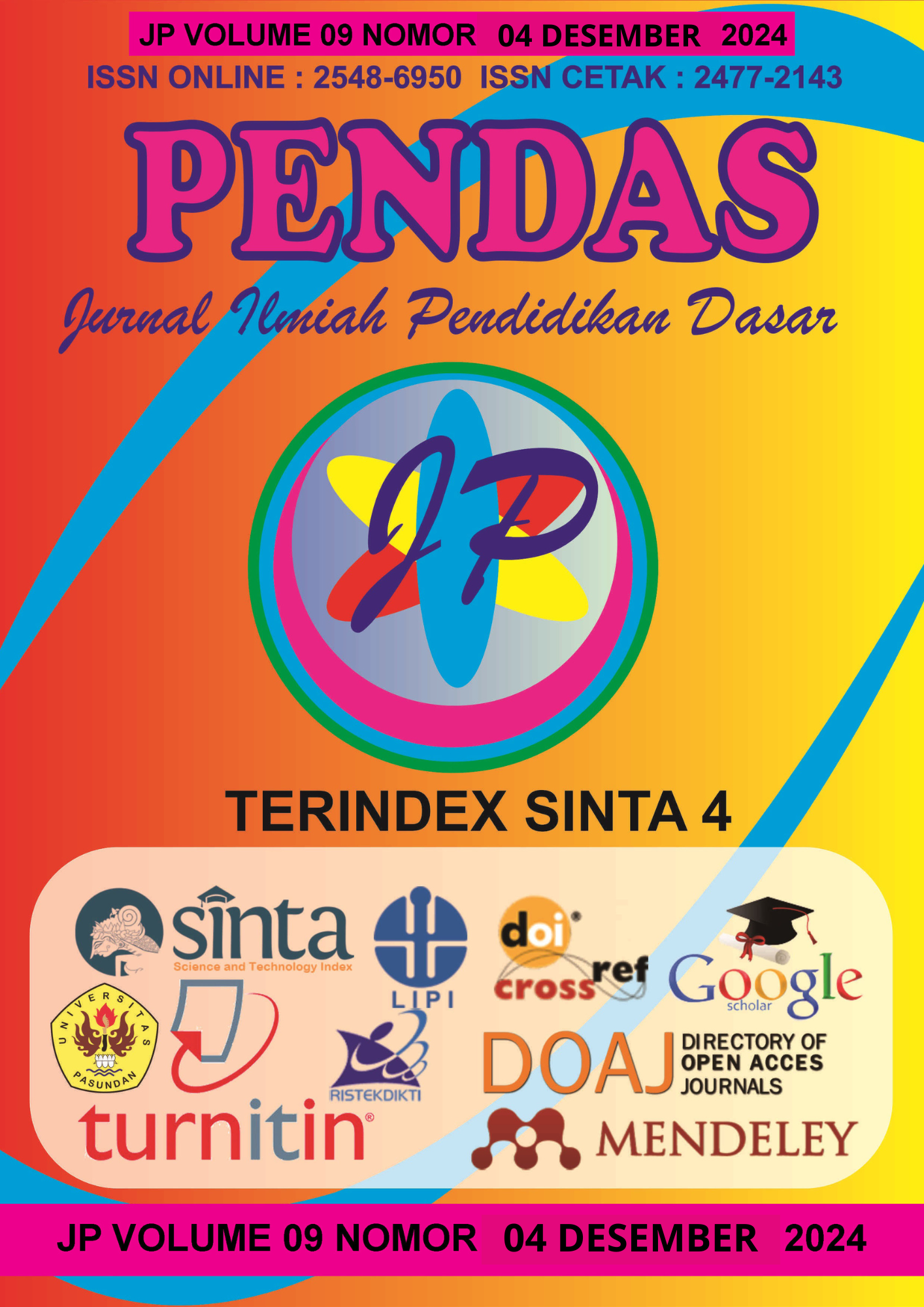ANALISIS KURIKULUM MANDIRI DI SEKOLAH ANAK BERKEBUTUHAN KHUSUS HARAPAN BANGKIT MULYA: STUDI KUALITATIF MELALUI WAWANCARA DAN OBSERVASI
DOI:
https://doi.org/10.23969/jp.v9i04.21578Keywords:
Independent Curriculum, Inclusive Education, Children with Special NeedsAbstract
A self-contained curriculum provides flexibility in planning, implementing and evaluating learning that focuses on developing students' life skills, academic and social-emotional abilities. This study aims to analyze the implementation of a self-contained curriculum at Harapan Bangkit Mulya School for Children with Special Needs, designed to meet the unique needs of students with disabilities. Using a descriptive qualitative approach, data was collected through in-depth interviews, observation and documentation, involving the principal, teachers and staff as research subjects. The results show that this curriculum is effective in creating inclusive learning that is relevant to students' needs. The practical and contextual approach becomes the main method in implementing learning, allowing students to learn through real experiences. The advantages of this curriculum include flexibility and focus on students' individual needs. However, there are challenges such as limited facilities, lack of teacher training, and lack of parental involvement.
Downloads
References
Ahmad Wahyu Hidayat. (2020). Inovasi Kurikulum dalam Perspektif Komponen-Komponen Kurikulum Pendidikan Agama Islam: Vol. II (Issue 1).
Akhyar, M., Remiswal, R., & Khadijah, K. (2024). Pelaksanaan evaluasi P5 dalam meningkatkan kreativitas dan kemandirian siswa pada mata pelajaran PAI di SMPN 1 VII Koto Sungai Sariak. Instructional Development Journal, 7(2), 362–372.
Balanchivadze, I., & Nikoladze, M. (2022). Developing individual lesson and transition plans. Language and Culture.
Bestari, D., & Mulyanti, D. (2024). Analysis and Implementation of the Effectiveness of Independent Curriculum at the Kupompong Child Growth and Development Clinic Inclusive Education Institution in Surabaya. Journal of Education Method and Learning Strategy, 2(03), 1024–1049. https://doi.org/10.59653/jemls.v2i03.1001
Fatimatuzzahrah, F., Sakinah, L., & Alyasari, S. A. (2024). Problematika Implementasi Kurikulum Merdeka Di Sekolah: Tantangan Membangun Kualitas Pendidikan. Jurnal Bintang Pendidikan Indonesia, 2(1), 43–53.
Hasibuan, K. N., Irawan, W. H., & Abdussakir, A. (2024). Strategi Guru dalam Mengatasi Kesulitan Operasi Perkalian Bilangan Bulat di Sekolah Dasar. Jurnal Ilmiah Profesi Pendidikan, 9(3), 1668–1674.
Kusumastuti, Adhi, & Khoiron, A. M. (2019). Metode penelitian kualitatif. Lembaga Pendidikan Sukarno Pressindo (LPSP), 9.
Lisdawati, L. (2024). Independent Curriculum Based Learning Management in Primary School Education Units. PPSDP International Journal of Education, 3(1), 1–8.
Melo, L. C. B. de, & Santos, S. F. dos. (2023). Inclusive education, special education and meaning: Necessary reflections in the light of historical-cultural psychology. In A LOOK AT DEVELOPMENT. Seven Editora. https://doi.org/10.56238/alookdevelopv1-195
Morgado, E. M. G., Licursi, M. B., & Silva, L. L. F. da. (2024). Multiple intelligences in an educational context: culturally based abilities and aptitudes in the body-mind binomial. Revista de Gestão Social e Ambiental, 18(2), 1–17.
Nordin, M. N., Baharudin, S. M., Mosbiran, N. F., & Abbas, M. S. (2024). Applications of Multiple Intelligence in Learning Process of Special Education Needs Student Visual Impairment. International Journal of Academic Research in Business and Social Sciences, 14.
Özer Sanal, S., & Erdem, M. (2023). Examination of Special Education with Constructivism: A Theoretical and Review Study. European Educational Researcher, 6(1), 1–20.
Rambod, M. (2018). Interviewing: The most common methods of data collection in qualitative studies. Sadra Medical Journal, 6(4), 303–316.
Rasid, S. A., Mukhibat, M., & Daryono, R. W. (2024). Evaluation of the Independent Curriculum in Special Schools to Enhance Participation of Children with Special Needs. Al-Hayat: Journal of Islamic Education, 8(2), 817–832.
Sa’adaturrodiyah, W. S., & Salma, M. F. (2024). ANALYSIS OF THE IMPLEMENTATION OF THE INDEPENDENT CURRICULUM ON STUDENTS’ INTERPERSONAL INTELLIGENCE. Kitaba, 2(2), 129–135. https://doi.org/10.18860/kitaba.v2i2.25560
Soeratman, S. (2017). PENDIDIKAN ANAK BERKEBUTUHAN KHUSUS. CV Prima Print.
Suryani, L., Khusna, R., Deviyanti, N., Marlina, N., Munasri, Mulyaningsih, T., Zakiyah, W., Yanti, S., & Asri Binawati. (2023). Independent Curriculum Implementation Training ror the Learning Teacher Community in Setu District. Jurnal Pengabdian Masyarakat Formosa, 2(1), 39–50. https://doi.org/10.55927/jpmf.v2i1.3140
Susanti, A., Sumarno, S., & Dwijayanti, I. (2024). Analisis Kebutuhan Pengembangan Kurikulum dalam Implementasi Meningkatkan Kemampuan Berpikir Kritis Siswa Sekolah Dasar. Tematik: Jurnal Penelitian Pendidikan Dasar, 3(1), 8–15.
Tunas, K. O., Daniel, R., & Pangkey, H. (2024). Kurikulum Merdeka: Meningkatkan Kualitas Pembelajaran dengan Kebebasan dan Fleksibilitas. Journal on Education, 06(04).
Ummah, R., Safara, N. S. T., Kurnilasari, A. R. U., Dimas’udah, H. R., & Sukma, V. A. M. (2023). Tantangan Atau Hambatan Dalam Menerapkan Pendidikan Inklusi. Jurnal Madrasah Ibtidaiyah, 2(1), 111-118.
Weston, L. E., Krein, S. L., & Harrod, M. (2022). Using observation to better understand the healthcare context. Qualitative Research in Medicine & Healthcare, 5(3), 9821.
Downloads
Published
Issue
Section
License
Copyright (c) 2025 Pendas : Jurnal Ilmiah Pendidikan Dasar

This work is licensed under a Creative Commons Attribution 4.0 International License.














































